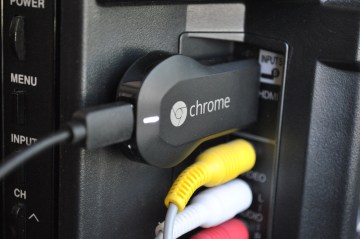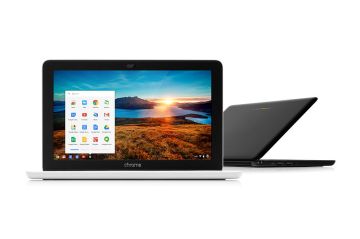A "mystery" barge, built with four levels of shipping containers, is seen at Treasure Island in San Francisco, California.
Whether it’s a legitimate mystery or a well-orchestrated publicity stunt, the so-called Google barge is getting plenty of attention. Speculation about the floating compound in San Francisco, along with another in Portland, Maine, began last month, fueling rumors, speculation and even a mention on The Daily Show.
In the latest details, gleaned by the San Francisco Chronicle from public documents, the barge will be an “unprecedented artistic structure” and “temporary technology exhibit space” that drives visitors to the city’s waterfront. Google hasn’t confirmed its involvement.
The most intriguing possibility, however, is that these barges are really an elaborate kick-off for Google retail stores.
While I have no inside knowledge of whether that’s the case, the timing for a Google store is right. Google has recently launched several new products, beyond its existing Nexus phones and tablets, that would benefit from public demonstration–and not just the experimental Google Glass.

Chromecast is one example. Customers could just go up to a designated phone or tablet in the store, choose a video from YouTube or Netflix and watch it pop up instantly on a nearby television. Chromecast’s $35 price tag would probably trigger a lot of impulse buying.
Chromebooks would also benefit from a retail store. Although these browser-based laptops have been around for a couple years now, Google finally has an eye-catching model in HP’s Chromebook 11, along with the luxury Chromebook Pixel. Having a store would allow Google to explain the benefits–and address the drawbacks–of a cheap laptop that doesn’t run Windows. (Best Buy has a special endcap for Chromebooks, but when I took my mother-in-law to check one out, an employee basically tried to dissuade her from buying.)
Beyond the actual hardware, Google could use a place to show off its apps and services. As we saw at Google IO this year, the company’s been putting a fine polish on products like Maps, Google+, Google Play Music and Google Now. There is now a unified design across all these products that users may not appreciate without seeing them all together, working across many different screen sizes.

Rumors about a possible Google store first emerged in February, when 9to5Google claimed that the stores would open in “major metropolitan areas” this holiday season. A second report by the Wall Street Journal offered no timeframe, cautioning that a 2013 launch might not happen.
But later that month Andy Rubin, then the head of Google’s Android efforts, debunked the reports, saying Google had no plans for retail stores. “They don’t have to go in the store and feel it anymore,” Rubin said, adding that the Nexus phone and tablet program isn’t “far enough along to think about the necessity of having these things in a retail store.” (Rubin stepped down from his Android post in March, ceding the job to Sundar Pichai, who’s also in charge of Google’s Chrome browser, Chrome OS and apps.)
Despite Google’s denials, there is evidence that the mysterious barges are Google stores in disguise. A couple weeks ago, CNet reported this interesting nugget:
[A] tipster, who is well-connected in Silicon Valley but asked to remain anonymous, told me that he had heard from multiple sources at Google that the company plans to float the Glass stores from city to city by rivers, and that the idea for the project came straight from either Larry Page or Sergey Brin, Google’s founders. Finally, he said, the idea is in part that Google wants to launch stores without looking like they are trying to chase Apple.
KPIX, a local CBS affiliate followed up last week with more unconfirmed details:
The building is constructed of interchangeable 40-foot shipping containers that can be assembled and disassembled at will, allowing it to be placed on barges, trucks or rail cars and taken anywhere in the world, the source said. Google could send it to a ski resort one day and then have it shipped to the beach a few days later.
If the goal of these barges is to build buzz for future stores, that mission is now accomplished. And if Google is trying to launch its stores in a way that doesn’t clone Apple, a set of modular units delivered by plane, train or boat would probably get the job done.
All of that just to promote Google Glass–a product that is not yet commercially available–seems way over the top. But as an attraction to bring people in and check out products they can actually buy and use, an elaborate floating structure doesn’t seem so crazy.

